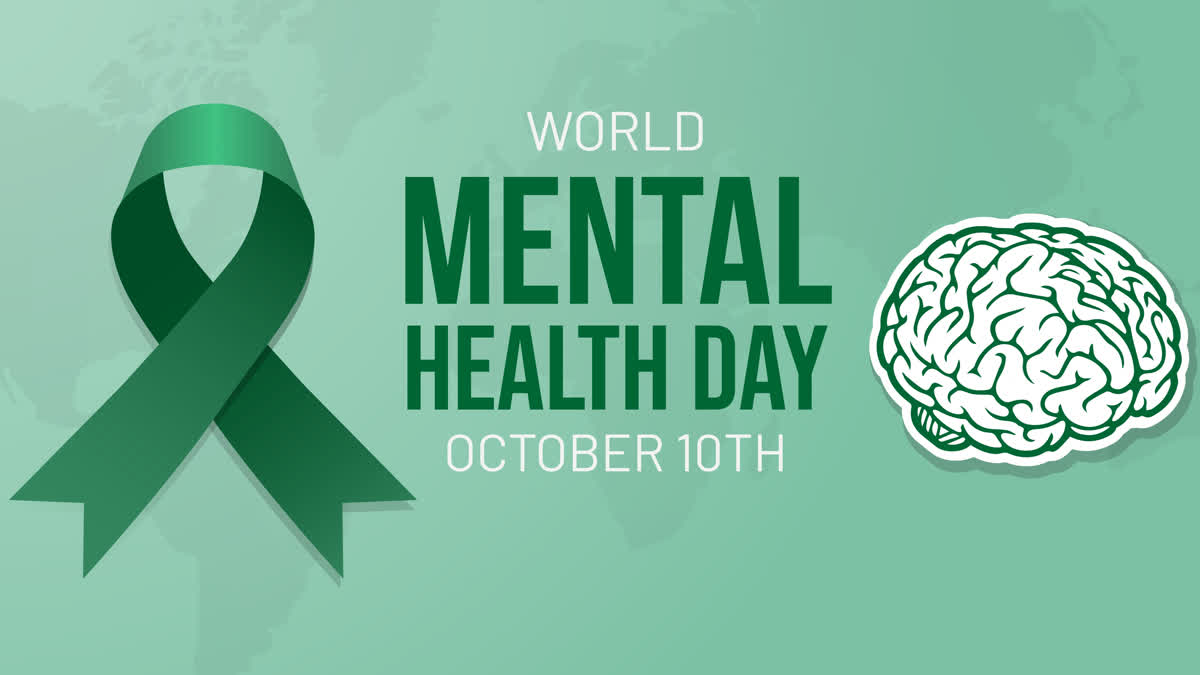Hyderabad: World Mental Health Day is observed annually on October 10 to hold a global initiative aimed at enhancing mental health awareness and education. The primary objective is to challenge societal stigma associated with mental health concerns.
History- Richard Hunter, Deputy Secretary General of the World Federation for Mental Health (WFMH), designated this day in 1992 marking the inception of a critical global mental health initiative spanning over 150 countries. The day was, however, established in 1948.
Objective- The focus of World Mental Health Day lies on fostering a deeper understanding of mental health issues worldwide and rallying support for mental health initiatives while dismantling societal stigma.
What is Mental Health?
- Mental health is the state of someone who is “functioning at a satisfactory level of emotional and behavioural adjustment”. It is the absence of any mental illness.
- According to the World Health Organisation (WHO), mental health is "subjective well-being, perceived self-efficacy, autonomy, competence, inter generational dependence, and self-actualisation of one's intellectual and emotional potential, among others".
- Mental Health issues may arise because of depression, stress, loneliness, anxiety, death of loved ones, mood disorders and various other mental illnesses. Therapy, counselling, or medication can help overcome these illnesses.
Why Mental Health is Important?
Understanding the imperative of mental health, which encompasses emotional, psychological, and social well-being, is crucial. Mental health significantly influences daily life, impacting thoughts, feelings, and actions at every stage of an individual's journey, from childhood through adulthood. The interconnectedness of mental and physical health underscores the need for addressing mental health challenges to mitigate the risk of associated physical health issues like diabetes and heart disease.
In India, mental health concerns represent a substantial burden, with a significant number of disability-adjusted life years and a high age-adjusted suicide rate. Economic losses attributed to mental health conditions further emphasize the urgency of interventions and support.
Various factors contribute to the onset of mental health problems, including adverse childhood experiences, discrimination, social disadvantages, and physical health conditions. Identifying symptoms like persistent sadness, excessive fears, or major changes in eating habits is crucial for timely intervention and support. Notably, the younger generation, particularly Gen Z, faces heightened mental health challenges due to academic pressures, social media comparisons, economic uncertainties, and the pervasive influence of technology.
Here is how you can Overcome from Mental Health Problems-
- Don't be embraced, Be vocal, ask for help from friends, family or doctor
- Get regular exercise. Just 30 minutes of walking every day can help boost your mood and improve your health.
- Make sleep a priority. Stick to a schedule, and make sure you’re getting enough sleep.
- Try a relaxing activity. Explore relaxation or wellness programs or apps, which may incorporate meditation, muscle relaxation, or breathing exercises.
- Eat healthy, regular meals and stay hydrated. A balanced diet and plenty of water can improve your energy and focus throughout the day.
- Set goals and priorities. Decide what must get done now and what can wait.Try to be mindful of what you have accomplished at the end of the day, not what you have been unable to do.
- Be positive. Identify and challenge your negative and unhelpful thoughts.
- Practice gratitude. Remind yourself daily of things you are grateful for. Be specific. Write them down at night, or replay them in your mind.
- Stay connected. Reach out to your friends or family members who can provide emotional support and practical help.
Breaking the stigma surrounding mental health is imperative, encouraging individuals to seek help and fostering a society that prioritizes mental well-being. In India, concerted efforts are underway, supported by initiatives like the National Mental Health Programme (NMHP) and the District Mental Health Programme (DMHP), among others. However, addressing the gap between mental health needs and available resources remains a crucial challenge.
